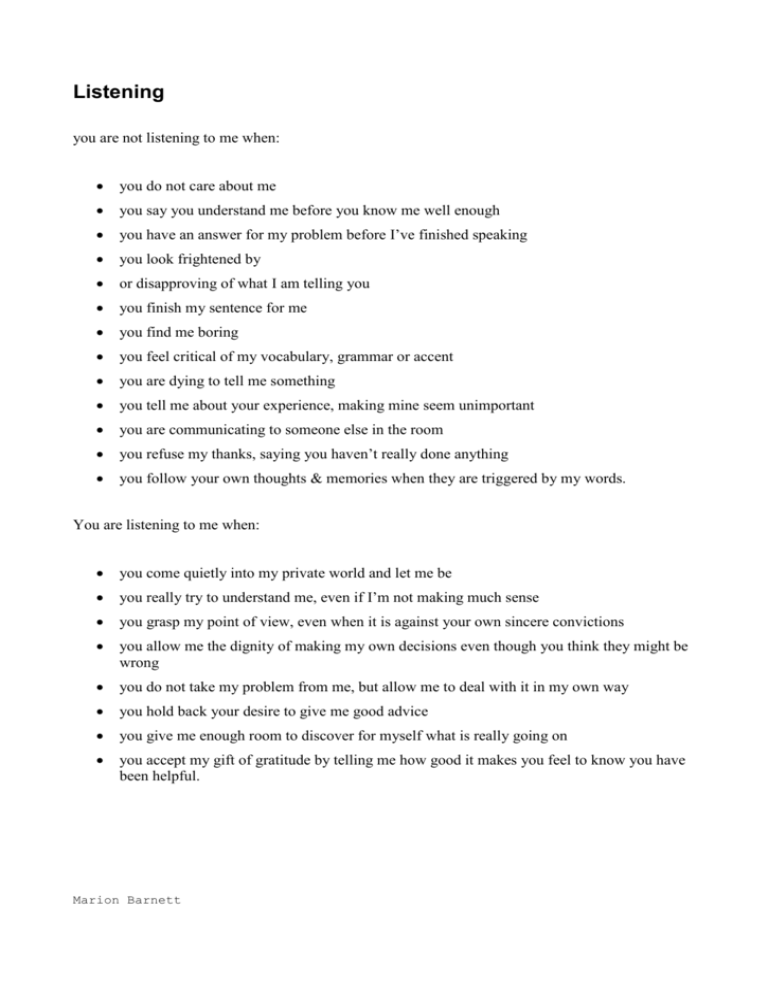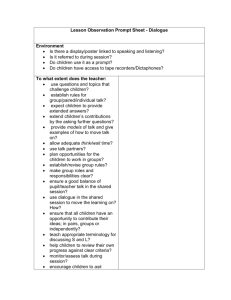Listening - GP Training.net
advertisement

Listening you are not listening to me when: you do not care about me you say you understand me before you know me well enough you have an answer for my problem before I’ve finished speaking you look frightened by or disapproving of what I am telling you you finish my sentence for me you find me boring you feel critical of my vocabulary, grammar or accent you are dying to tell me something you tell me about your experience, making mine seem unimportant you are communicating to someone else in the room you refuse my thanks, saying you haven’t really done anything you follow your own thoughts & memories when they are triggered by my words. You are listening to me when: you come quietly into my private world and let me be you really try to understand me, even if I’m not making much sense you grasp my point of view, even when it is against your own sincere convictions you allow me the dignity of making my own decisions even though you think they might be wrong you do not take my problem from me, but allow me to deal with it in my own way you hold back your desire to give me good advice you give me enough room to discover for myself what is really going on you accept my gift of gratitude by telling me how good it makes you feel to know you have been helpful. Marion Barnett Some guidelines for paired listening and group listening These guidelines are designed to help you to learn some new things about listening, and making closer connections with the people you work with. In normal circumstances, or in meetings, we usually listen casually, jumping in to offer our comments whenever we think of something to say. We look for what we want to know, and comment on our thoughts about each topic of interest to us. When we listen to clients/patients we have our own agenda in mind, specific information to find out, and many other distractions. The listening you are encouraged to do here is different, however: The idea is to listen in order to assist the person who is talking. We rarely have the chance to examine our thoughts and experiences at our own pace without interruption from outside demands on us. We try to solve problems, but seldom have time to understand why our solutions succeeded or failed. Listening in this way is set up to give the speaker precious time to think and to develop trust in their own fine intelligence. When you listen to your client/patient or listening partner unfold their thoughts, it will be your job to protect them from interruption and judgment. With your attention, they will be able to examine their thinking more closely, having chance to sort through their experience, without the usual worry and rush. As a listener, you will learn more about who your client/patient or listening partner is, and how they think and feel, when you put aside what you are curious about or how your experience compares. On this course you will get your turn too. Here are some short guidelines to help you to begin to listen as an assistant to another person: • Adopt an attitude of full respect for yourself and for your client/patient or listening partner. • Assume that your listening, backed by your respect and caring, will be of key significance to the person who is talking. • Give your full attention to the person who is speaking. Do not interrupt. • Do not offer advice. Instead, offer an attitude of trust in each person’s ability to think, experiment and problem-solve. • Openly praise the good you see in yourself and others. • Keep the situation strictly confidential. Don’t refer to what the speaker has said when it is your turn to talk, when you meet on another occasion or in conversations with others. • Maintain good eye contact. • Show that you are Interested and delighted to be listening. Guidelines for how to work as co-tutors As listener 1. Be relaxed & punctual. Ensure you will be free from interruptions. 2. Have a pleasant environment to work in - bright, attractive. 3. Adopt an attitude of full respect for yourself and your colleague(s). It is best if your attitude is pleased and accepting; and if this shows on your face it will be even easier for your speaker. 4. It is OK to shift around a little and remain comfortable. You may also need to check the time towards the end of the session. 5. Keep eye contact, even if the speaker does not. 6. Begin by listening. Assume that your listening, backed by your respect and caring will be of key significance to your colleague. 7. Give your full attention. Do not interrupt. Do not judge. 8. You will gradually learn how to draw your co-tutor out in a permissive way and later to become more active as a tutor. 9. After a few sessions you can start to ask open questions - questions that leave the speaker free to say exactly how they feel: e.g. not “I bet that upset you” or “Did you feel angry?” but “How do you feel?” or “What are you thinking?” REMEMBER: all questions must be asked for your colleague not out of your own curiosity. Keep your questions few to begin with. 10. Do not offer advice. It is not your job to solve their problems for them. Instead, offer an affitude of trust in your colleague’s ability to think, experiment and problem-solve. 11 .The main thing that gets In the way of listening well is that, as we listen, our feelings get triggered by what is said. Something re-stimulates our own experiences so that, instead of thinking about the person in front of us, we think about ourselves. This may cause us to go blank, panic, get lost in our own feelings. Even when we are very experienced we struggle with this from time to time. Gently remind yourself to put your attention back on your colleague, and, if necessary, stop the session and ask your colleague to give you 5 minutes to think aloud, through what is going on for you until you are ready to do this. 12. If necessary spend the last few minutes of each session bringing our colleague back to the present by asking them questions, or validating them. 13. Keep the situations and feelings raised by your colleague STRICTLY CONFIDENTIAL. Do not refer to what they have said at a later date, nor at the close of a session as you say goodbye, not even to wish them well with it. As Speaker 1. This time is you, to do what you want: e.g. rest, think aloud, review a particular situation, plan the future, share the past. 2. Start with a focus of “What is going well in my work/life?” and “What prevents it going even better?” rather than “What is wrong?”, “what are the problems?” - Your niggles will come up. 3. When you start your session, focus on your listener, look at their face, notice that they are there. Sometimes it is hard to believe that someone is really there for us - laugh if it feels uncomfortable. 4. Try to accept that your listener will not interrupt. 5. If feelings come up and you need to cry, laugh, yawn or shake - that is fine: do it. It is also fine just to talk or to sit in silence for a time. 6. As you learn what helps you to work through issues for yourself and what does not, note them down and tell your listener. Encourage your listener to note it as well. 7. Remember listening gets inhibited by our desperation to get listened to. 8. It may not seem very natural at first - but, like any skill, it works if you spend time and work at it. 9. Enjoy it! Please note: Do not have alcohol in your system whilst working; and do not smoke, drink or eat during sessions.




